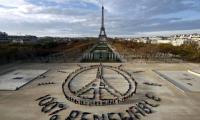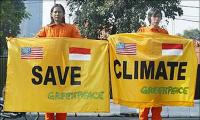India Urges Rich Nations to Remove Tech Barriers for Climate Action
India calls for developed nations to achieve net-zero emissions by 2030, remove tech transfer restrictions, increase climate finance, and avoid trade measures disguised as climate action at UN climate talks in Baku.

Baku (Azerbaijan), Nov 18 (PTI) India on Monday called on developed countries to become net-zero by 2030, remove barriers to technology transfer, increase public climate finance, and avoid unfair trade measures disguised as climate action.
The appeal came during a high-level ministerial roundtable on pre-2030 ambition at the UN climate talks in Baku.
India's environment secretary Leena Nandan said rich nations taking the lead in cutting emissions and achieving net-zero by 2030 is essential to build a stronger, sustainable future.
The official said that innovative technologies are critical for a low-carbon future but said they must be made accessible to developing countries.
Developing countries need solutions like clean energy and carbon removal, but barriers like intellectual property rights make it hard for them to access these technologies, Nandan said.
COP29 should come up with practical solutions to make technology affordable, adaptable, and relevant for developing countries, she added.
India asked developed countries to close the massive climate finance gap delaying climate action in developing countries.
"Trillions of dollars are needed for clean energy projects, disaster-resilient infrastructure, and climate adaptation... It should be ensured that deviation from least-cost development pathways committed by developing countries are fully met though public finance by developed countries.
"Not doing so puts additional cost on people in developing countries bearing a disproportionate burden of climate change without having caused the problem," Nandan said.
A new climate finance package to help developing nations reduce greenhouse gas emissions and adapt to climate change is the top priority of this year's UN climate talks.
With climate impacts worsening, developing countries need at least USD 1.3 trillion every year in financial support. They argue this should come from developed countries' government funding, not from the private sector, which is driven by profit and not accountable to the UN climate process.
India also raised strong objections to unilateral trade measures like the European Union's Carbon Border Adjustment Mechanism (CBAM), which it said unfairly shifts the costs of climate action to poorer nations.
These measures hurt international cooperation and add financial burdens to developing countries, Nandan warned.
The CBAM is the EU's proposed tax on energy-intensive products like iron, steel, cement, fertilizers, and aluminum imported from countries such as India and China.
The bloc claims that this mechanism creates fair competition for domestic goods, which must meet stricter environmental standards, and helps reduce emissions from imports.
Finance Minister Nirmala Sitharaman last month termed CBAM "unilateral and arbitrary" and said such measures could potentially harm India's industries and disrupt the balance in international trade.
According to Delhi-based think tank Centre for Science and Environment, CBAM will impose an additional 25 per cent tax on carbon-intensive goods exported from India to the EU. This tax burden would represent 0.05 per cent of the country's GDP.
India also highlighted that global emissions could peak by 2030, as the 2024 NDC synthesis report projects that emissions will be 2.6 per cent lower in 2030 compared to 2019 levels.
This is achievable if all countries work together. But for this to happen, developing nations need access to finance, technology, and capacity-building support, it said.
The appeal came during a high-level ministerial roundtable on pre-2030 ambition at the UN climate talks in Baku.
India's environment secretary Leena Nandan said rich nations taking the lead in cutting emissions and achieving net-zero by 2030 is essential to build a stronger, sustainable future.
The official said that innovative technologies are critical for a low-carbon future but said they must be made accessible to developing countries.
Developing countries need solutions like clean energy and carbon removal, but barriers like intellectual property rights make it hard for them to access these technologies, Nandan said.
COP29 should come up with practical solutions to make technology affordable, adaptable, and relevant for developing countries, she added.
India asked developed countries to close the massive climate finance gap delaying climate action in developing countries.
"Trillions of dollars are needed for clean energy projects, disaster-resilient infrastructure, and climate adaptation... It should be ensured that deviation from least-cost development pathways committed by developing countries are fully met though public finance by developed countries.
"Not doing so puts additional cost on people in developing countries bearing a disproportionate burden of climate change without having caused the problem," Nandan said.
A new climate finance package to help developing nations reduce greenhouse gas emissions and adapt to climate change is the top priority of this year's UN climate talks.
With climate impacts worsening, developing countries need at least USD 1.3 trillion every year in financial support. They argue this should come from developed countries' government funding, not from the private sector, which is driven by profit and not accountable to the UN climate process.
India also raised strong objections to unilateral trade measures like the European Union's Carbon Border Adjustment Mechanism (CBAM), which it said unfairly shifts the costs of climate action to poorer nations.
These measures hurt international cooperation and add financial burdens to developing countries, Nandan warned.
The CBAM is the EU's proposed tax on energy-intensive products like iron, steel, cement, fertilizers, and aluminum imported from countries such as India and China.
The bloc claims that this mechanism creates fair competition for domestic goods, which must meet stricter environmental standards, and helps reduce emissions from imports.
Finance Minister Nirmala Sitharaman last month termed CBAM "unilateral and arbitrary" and said such measures could potentially harm India's industries and disrupt the balance in international trade.
According to Delhi-based think tank Centre for Science and Environment, CBAM will impose an additional 25 per cent tax on carbon-intensive goods exported from India to the EU. This tax burden would represent 0.05 per cent of the country's GDP.
India also highlighted that global emissions could peak by 2030, as the 2024 NDC synthesis report projects that emissions will be 2.6 per cent lower in 2030 compared to 2019 levels.
This is achievable if all countries work together. But for this to happen, developing nations need access to finance, technology, and capacity-building support, it said.
You May Like To Read
TODAY'S MOST TRADED COMPANIES
- Company Name
- Price
- Volume
- Vodafone Idea L
- 8.10 (+ 18.94)
- 352105814
- GTL Infrastructure
- 1.50 (+ 7.14)
- 20982285
- G G Engineering
- 0.90 (+ 11.11)
- 20091512
- AvanceTechnologies
- 0.54 ( -8.47)
- 18780688
- YES Bank Ltd.
- 17.33 (+ 2.61)
- 14468025






 © 2025 Rediff.com India Limited. All rights reserved.
© 2025 Rediff.com India Limited. All rights reserved.